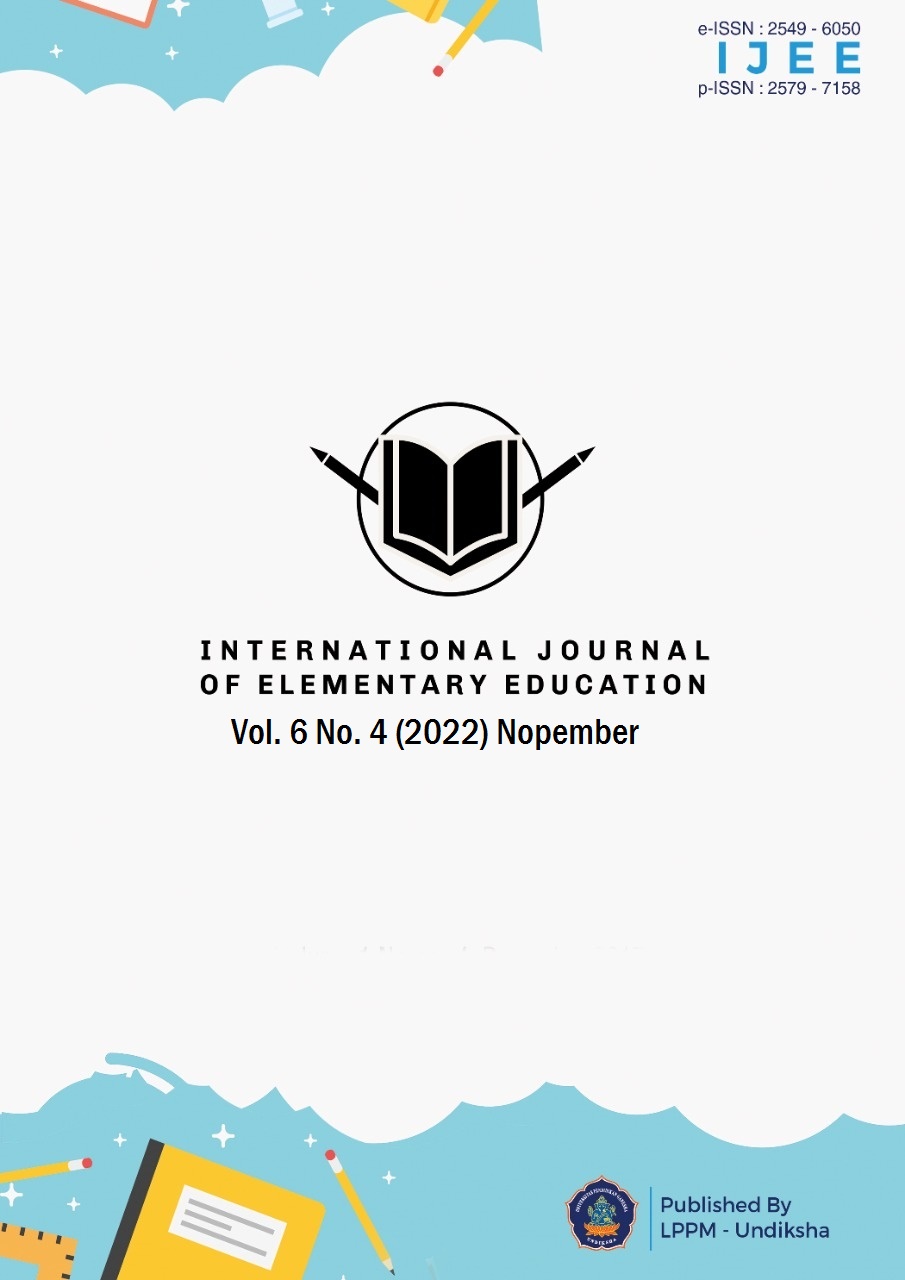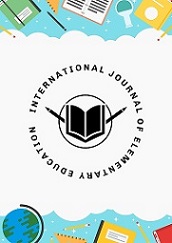The New Paradigm of Merdeka Curriculum: Implementation of Pancasila Education Subject in Elementary School
DOI:
https://doi.org/10.23887/ijee.v7i1.54092Keywords:
New paradigm of merdeka curriculum, Pancasila education, Elementary schoolAbstract
This research is motivated by the implementation of a new curriculum for elementary schools in Indonesia, namely the Merdeka Curriculum. The Merdeka Curriculum brings changes to educational standards in elementary schools. Pancasila education is compulsory, and learning with the New Paradigm is the standard process for elementary education. This study aims to analyses about the intervention process carried out by schools in terms of implementing Pancasila Education subjects with the Merdeka Curriculum. This research was conducted through a qualitative design with a case study approach. The subjects of this study were teachers of the first batch of schools that implemented the Merdeka Curriculum. The sample selection used the purposive sampling method. Data collection techniques using interviews, observation and documentation studies. The validity of the data was obtained through a source, technique and time triangulation. Data analysis was performed using the Creswell qualitative data analysis technique with the NVivo program. The implementation results cover eight aspects: diagnostic assessment, differentiated learning, discussion and collaboration, character building, learning projects, learning resources based on information and communication technology, formative and summative assessments. This study concludes that the implementation of Pancasila Education Subject has followed the standard process of the New Paradigm Merdeka Curriculum. The suggestion from this study is to improve teacher skills in applying a more varied differentiated approach and conducting formative assessments through process assessment to optimize the implementation of the Merdeka Curriculum in the Pancasila Education subject.
References
Aditomo, A. (2022). Capaian Pembelajaran Pada Pendidikan Anak Usia Dini, Jenjang Dasar, dan Pendidikan Menengah pada Kurikulum Merdeka. Jakarta: Kementerian Pendidikan, Kebudayaan, Riset dan Tekonologi.
Aprima, D., & Sari, S. (2022). Analisis Penerapan Pembelajaran Berdiferensiasi dalam Implementasi Kurikulum Merdeka pada Pelajaran Matematika SD. Cendikia: Media Jurnal Ilmiah Pendidikan, 13(1), 95–101. https://doi.org/10.35335/cendikia.v13i1.2960.
Arifin, A. (2021). Internalization of Pancasila Values and Nationalism in High Schools Through Citizenship Education. AL-ISHLAH: Jurnal Pendidikan, 13(3), 1899–1908. https://doi.org/10.35445/alishlah.v13i3.1238. DOI: https://doi.org/10.35445/alishlah.v13i3.1238
Astuti, N., Efendi, U., Riswandi, & Haya, F. F. (2022). The Impact of Project Based Learning Model on Creative Thinking Ability of Forth Grade Students. International Journal of Elementary Education, 6(3). https://doi.org/https://doi.org/10.23887/ijee.v6i3.48881.
Aziz, A. (2011). Curriculum Development in Indonesian Education. Curriculum Development in Indonesian Education, 3(2). https://doi.org/10.18860/jt.v0i0.1312.
Çakiroğlu, Ü., & Erdemir, T. (2018). instructor and students Online project based learning via cloud computing : exploring roles of instructor and students. Interactive Learning Environments, 27(4), 547–566. https://doi.org/10.1080/10494820.2018.1489855. DOI: https://doi.org/10.1080/10494820.2018.1489855
Creswell, J. W. (2012). Educational Research Planning, Conducting and Evaluating Quantitative and Qualitative Research (Fourth). Pearson Education, Inc.
Dasmana, A., Wasliman, I., Ujang, ;, Barlian, C., & Yoseptri, R. (2022). Implementation of Integrated Quality Management Strengthening Character Education in Realizing Pancasila Student Profiles. International Journal Of Graduate Of Islamic Education, 3(2), 361. https://doi.org/10.37567/ijgie.v3i2.1342. DOI: https://doi.org/10.37567/ijgie.v3i1.1183
Deunk, M. I., Smale-Jacobse, A. E., Hester de Boer, S. D., & Bosker, R. J. (2018). Effective differentiation Practices:A systematic review and meta-analysis of studies on the cognitive effects of differentiation practices in primary education. Educational Research Review, 24(1), 31–54. https://doi.org/10.1016/j.edurev.2018.02.002. DOI: https://doi.org/10.1016/j.edurev.2018.02.002
Dewantara, J. A., Suhendar, I. F., Rosyid, R., & Atmaja, T. S. (2019). Pancasila as Ideology and Characteristics Civic Education in Indonesia. International Journal for Educational and Vocational Studies, 1(5), 400–405. https://doi.org/10.29103/ijevs.v1i5.1617. DOI: https://doi.org/10.29103/ijevs.v1i5.1617
Dewi, F. (2015). Upaya Peningkatan Keterampilan Abad 21 Calon Guru Sekolah Dasar Melalui Model Pembelajaran Berbasis Proyek. Metodik Didaktik, 9(2), 1–15. https://doi.org/10.17509/md.v9i2.3248.
Faiz, A., Parhan, M., & Ananda, R. (2022). Paradigma Baru dalam Kurikulum Prototipe. Jurnal Edukatif, 4(1), 1544–1550. https://doi.org/10.31004/edukatif.v4i1.2410. DOI: https://doi.org/10.31004/edukatif.v4i1.2410
Fibra, N. P., & Indrawadi, J. (2021). Kendala-Kendala dalam Penyusunan dan Pelaksanaan Rencana Pelaksanaan Pembelajaran Program Merdeka Belajar. Journal of Education, Cultural and Politics, 1(2), 70–76. https://doi.org/10.24036/jecco.v1i2.13. DOI: https://doi.org/10.24036/jecco.v1i2.13
Gaitas, S., & Alves Martins, M. (2017). Teacher perceived difficulty in implementing differentiated instructional strategies in primary school. International Journal of Inclusive Education, 21(5), 544–556. https://doi.org/10.1080/13603116.2016.1223180. DOI: https://doi.org/10.1080/13603116.2016.1223180
Herwina, W. (2021). Optimalisasi Kebutuhan Siswa dan Hasil Belajar dengan Pembelajaran Berdiferensiasi. Perspektif Ilmu Pendidikan, 35(2), 175–182. https://doi.org/10.21009/PIP.352.10. DOI: https://doi.org/10.21009/PIP.352.10
Indarta, Y., Jalinus, N., Samala, A. D., Riyanda, A. R., & Adi, N. H. (2022). Relevansi Kurikulum Merdeka Belajar dengan Model Pembelajaran Abad 21 dalam Perkembangan Era Society 5 . 0. Edukatif : Jurnal Ilmu Pendidikan, 4(2), 3011–3024. https://doi.org/10.31004/edukatif.v4i2.2589. DOI: https://doi.org/10.31004/edukatif.v4i2.2589
Kartini, D., & Anggraini, D. (2021). Implementasi Pancasila dalam Pendidikan di Sekolah Dasar. Journal of Education, Psychology and Counseling, 3(1), 113–118. https://ummaspul.e-journal.id/edupsycouns/article/view/1304.
Kliebard, H. M. (2017). The Tyler Rationale revisited. International Journal of Curriculum Studies, 27(1), 80–88. https://doi.org/10.1080/0022027950270107. DOI: https://doi.org/10.1080/0022027950270107
Kruit, P. M., Oostdam, R. J., van den Berg, E., & Schuitema, J. A. (2018). Assessing students’ ability in performing scientific inquiry: instruments for measuring science skills in primary education. Research in Science and Technological Education, 36(4), 413–439. https://doi.org/10.1080/02635143.2017.1421530. DOI: https://doi.org/10.1080/02635143.2017.1421530
Kusdarini, E., Sunarso, S., & Arpannudin, I. (2020). The implementation of pancasila education through field work learning model. Cakrawala Pendidikan, 39(2), 359–369. https://doi.org/10.21831/cp.v39i2.31412. DOI: https://doi.org/10.21831/cp.v39i2.31412
Lindner, K. T., & Schwab, S. (2020). Differentiation and individualisation in inclusive education: a systematic review and narrative synthesis. International Journal of Inclusive Education, 0(0), 1–21. https://doi.org/10.1080/13603116.2020.1813450. DOI: https://doi.org/10.1080/13603116.2020.1813450
Mahasneh, A. M., & Alwan, A. F. (2018). The effect of project-based learning on student teacher self-efficacy and achievement. International Journal of Instruction, 11(3), 511–524. https://doi.org/10.12973/iji.2018.11335a. DOI: https://doi.org/10.12973/iji.2018.11335a
Maros, M., Korenkova, M., Fila, M., Levicky, M., Maros, M., Korenkova, M., Fila, M., & Levicky, M. (2021). Project-based learning and its effectiveness : evidence from Slovakia. Interactive Learning Environments, 0(0), 1–9. https://doi.org/10.1080/10494820.2021.1954036. DOI: https://doi.org/10.1080/10494820.2021.1954036
Moosa, V., & Shareefa, M. (2019). The impact of teachers’ experience and qualification on efficacy, knowledge and implementation of differentiated instruction. International Journal of Instruction, 12(2), 587–604. https://doi.org/10.29333/iji.2019.12237a. DOI: https://doi.org/10.29333/iji.2019.12237a
Mulyana, D. (2019). Growing Student’S Motivation in Pancasila and Citizenship Education With the Concept of Lesson Study. International Journal Pedagogy of Social Studies, 4(2), 71–76. https://doi.org/10.17509/ijposs.v4i2.21129.
Natalia, E. D., Veronica, P., Anisa, A., & Dewi, M. (2021). Implementation of Pancasila Values in Character Education: A Literature Review. International Journal Pedagogy of Social Studies, 6(1), 35–42. https://doi.org/10.17509/ijposs.v6i1.32569. DOI: https://doi.org/10.17509/ijposs.v6i1.32569
Nurhasanah, & Tanjung, S. (2022). The Effect Of The Project Based Learning Model With A Visit Home Approach And Learning Style On Ips Learning Outcomes In Elementary. International Journal Of Education and Linguistics, 2(1), 80–93. https://doi.org/10.17509/ijposs.v4i2.21129.
Nurhayati. (2022). Strengthening Pancasila Student Profiles In Independent Learning Curriculum In Elementary School. Lnternational Journal of Humanities and Social Science (IJHESS), 1(6), 976–988. https://doi.org/10.55227/ijhess.v1i6.183. DOI: https://doi.org/10.55227/ijhess.v1i6.183
Rahmadayanti, D., & Hartoyo, A. (2022). Potret Kurikulum Merdeka, Wujud Merdeka Belajar di Sekolah Dasar. Jurnal Basicedu, 6(4), 7181–7190. https://doi.org/10.31004/basicedu.v6i4.3431. DOI: https://doi.org/10.31004/basicedu.v6i4.3431
Saputra, S., & Abdulkarim, A. (2021). Analysis of Civics Textbooks in Framework of the 21 st Century Learning. Education and Humanities Research, 636(Acec 2021), 453–458. https://doi.org/10.2991/assehr.k.220108.082. DOI: https://doi.org/10.2991/assehr.k.220108.082
Setiyo, A. (2022). Penerapan pembelajaran diferensiasi kolaboratif dengan melibatkan orang tua dan masyarakat untuk mewujudkan student’s well-being di masa pandemi. Bioma : Jurnal Ilmiah Biologi, 11(1), 61–78. https://doi.org/10.26877/bioma.v11i1.9797. DOI: https://doi.org/10.26877/bioma.v11i1.9797
Simanjuntak, S. S., & Listiani, T. (2020). Penerapan Differentiated Instruction dalam Meningkatkan Pemahaman Konsep Matematika Siswa Kelas 2 SD. Scholaria: Jurnal Pendidikan Dan Kebudayaan, 10(2), 134–141. https://doi.org/10.24246/j.js.2020.v10.i2.p134-141. DOI: https://doi.org/10.24246/j.js.2020.v10.i2.p134-141
Sufyadi., L., Tjatruringsih., F., Sandra., S., Yayuk., M., & Rizal. (2021). Pembelajaran Paradigma Baru. Jakarta: Kemendikbud.
Sugiyono. (2020). Metode Penelitian Manajemen. Bandung: Alfabeta.
Susilowati, W. W., & Suyatno, S. (2021). Teacher competence in implementing higher-order thinking skills oriented learning in elementary schools. Premiere Educandum : Jurnal Pendidikan Dasar Dan Pembelajaran. https://doi.org/10.25273/pe.v11i1.7762. DOI: https://doi.org/10.25273/pe.v11i1.7762
Towaf, S. M. (2016). The National Heritage of Ki Hadjar Dewantara in Tamansiswa About Culture-Based Education and Learning. Journal of Education and Practice, 7(23), 167–176. https://eric.ed.gov/?id=EJ1112759.
Wasimin. (2022). Project Based Learning As A Media For Accelerating The Achievement Of Profil Pelajar Pancasila In The Program Sekolah Penggerak. International Journal of Social Science (IJSS), 1(6), 1001–1008. https://doi.org/10.53625/ijss.v1i6.1924. DOI: https://doi.org/10.53625/ijss.v1i6.1924
Yustina, I. M., Ariska, D., & Arnentis, D. (2022). The Effect of E-Learning Based on the Problem-Based Learning Model on Students ’ Creative Thinking Skills During the Covid-19 Pandemic. International Journal of Instruction, 15(2), 329–348. https://eric.ed.gov/?id=EJ1341621. DOI: https://doi.org/10.29333/iji.2022.15219a
Zalik, & Saidi, Mahmuda, I. A. (2020). Character Education in the New Paradigm of Pancasila Citizenship Education. Journal of Educational Research, 8(12), 6893–6901. https://doi.org/10.13189/ujer.2020.081255. DOI: https://doi.org/10.13189/ujer.2020.081255
Downloads
Published
How to Cite
Issue
Section
License
Copyright (c) 2023 Fransiska Faberta Kencana Sari

This work is licensed under a Creative Commons Attribution-ShareAlike 4.0 International License.
Authors who publish with the International Journal of Elementary Education agree to the following terms:
- Authors retain copyright and grant the journal the right of first publication with the work simultaneously licensed under a Creative Commons Attribution License (CC BY-SA 4.0) that allows others to share the work with an acknowledgment of the work's authorship and initial publication in this journal.
- Authors are able to enter into separate, additional contractual arrangements for the non-exclusive distribution of the journal's published version of the work (e.g., post it to an institutional repository or publish it in a book), with an acknowledgment of its initial publication in this journal.
- Authors are permitted and encouraged to post their work online (e.g., in institutional repositories or on their website) prior to and during the submission process, as it can lead to productive exchanges, as well as earlier and greater citation of published work. (See The Effect of Open Access)










